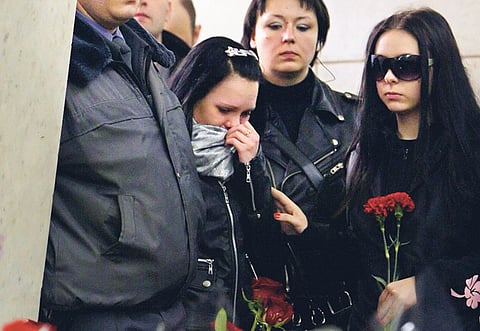Moscow on edge after Metro blast toll climbs to 39
Lawmakers call for death penalty for terrorism

Moscow: Russians Tuesday nervously returned to subway stations where two suicide bombers killed 39 people, lighting candles and leaving heaps of carnations at one site as the country began a day of mourning.
Monday's attacks shocked a country that had grown accustomed to such violence being confined to a restive southern corner and marked the return of terrorism to the everyday lives of Muscovites after a six-year break.
Many have speculated that the blasts, blamed on North Caucasus rebels, were retaliation for the recent killing of separatist leaders in the region by Russian police.
Some lawmakers yesterday called for the return of the death penalty for terrorism, and President Dmitry Medvedev in televised remarks called on judges to consider amending terrorism laws.
The city remained on edge, even as people began to commute on the subway again. "I feel the tension on the metro, nobody's smiling or laughing," university student Alina Tsaritova, not far from the Lubyanka station, one of the targets, said.
The preliminary investigation found that female suicide bombers detonated belts of explosives during the Monday morning rush-hour at the stations.
Critical
Five people remain in critical condition out of 71 hospitalised after the blasts, city health department official Andrei Seltsovsky told the Rossiya-24 state news channel. Only eight victims had been formally identified, he said.
Some commuters said yesterday they would try and block the events out of their mind completely.
"We have to live with this, not to think about it, especially when we're underground," Tatyana Yerofeyeva, a Muscovite in her early 50s, said.
As public outrage swells, the upper house of parliament is proposing bringing back the death penalty for such crimes, a lawmaker was quoted as saying.
"This is our reaction to yesterday's tragic events," Anatoly Kyskov, the Federation Council's legal committee chairman, said in comments carried by state news agency RIA Novosti.
Medvedev called on chairmen from the Supreme Court and the High Court of Arbitration to propose ways to "perfect" terrorism laws.
Russia announced a moratorium on capital punishment when it joined the Council of Europe in 1996 and pledged to abolish it, but has not done so. The Kremlin-controlled parliament has been reluctant to fully outlaw executions, due to broad public support for the death penalty.
Sign up for the Daily Briefing
Get the latest news and updates straight to your inbox


